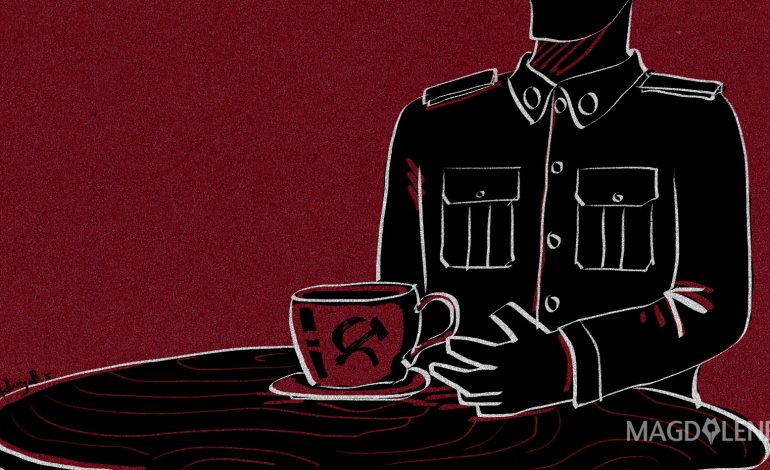Who’s Afraid of the ‘Big Bad’ Communists?

Yes, you are angry. You were angry that the Jakarta Police Chief opened an FPI movie night and spoke about the cooperation between Muslims and security forces in fighting communism. Yes, you were angry about the intimidation and deportation of Tom Iljas. Yes, you’ve read the scanned pages of Lentera. Yes, as a longtime supporter of Ubud Writers and Readers Festival, you’re upset with the police’s gag orders on several “politically sensitive” topics, and maybe even disappointed that the organizer didn’t resist.
So what’s with all these phobias on communists? What triggered the outrage and the implications (aside from the fact that October 2015 was the fiftieth anniversary of the 30 September Movement)? Why Ariel Heryanto’s assessment of “Where Communism Never Dies” is still relevant more than 15 years later? How could Taufiq Ismail emerge from the Frankfurt Book Fair in one piece?
My late grandfather was an Army colonel. The story goes that he was offered a spot in the elite presidential guard Cakrabirawa (named after Lord Krishna’s weapon) but refused, and so he and his family were safe from post-1965 anti-communist purge, during which the unit was implicated in the aborted coup. Mom also remembered that unknown soldiers knocked on the door in 1965, and mercifully left after she and her siblings stay silent and pretended nobody’s home.
Of course nobody really liked the communists in the ‘90s. I learned in school about how evil they were, and thankfully I didn’t have to watch and make any report about that dreaded movie (you realize that it’s so wrong to force kids to watch a highly violent movie, right?). I learned from TV and video games that the commies used inferior fighter jets, would lose any fist fight and gun fight, and were easily hypnotized by the superior American culture. Besides, the Berlin Wall had been torn down, the Tiananmen Massacre proved that communists are evil, and by Christmas Day 1991 the USSR ceased to exist.
So why did the military and the government of Indonesia still talk about communism in those years, even as Hollywood was scrambling for new kinds of enemy (Arab terrorists, aliens, US president himself)? Labor strike: communist plot. Student protest: communist plot. Inflatable hammer made in China: communist plot. Old habit dies hard.
With the fall of Suharto in 1998, Indonesians were hoping that now it’s safe to talk about Marxism. The Catholic priest Franz Magnis-Suseno was finally able to publish his history of Marxism. In the introduction, he insists that while he cannot agree with communism, it’s necessary to understand the thoughts of Karl Marx and Friedrich Engels, their Anarchist rivals, other early socialists, and so on. He is right to say that “you cannot throw the baby with the bathwater”. But it didn’t prevent pro-government militia Eurico Guterres from raiding bookstores to seize books that “are harming Indonesians”, along with Khalil Gibran’s works and Chicken Soup for the Soul.
It is a bit confusing that the actions against UWRF and Lentera took place in 2015. By mid-2000s the market was saturated with reprints and translations of socialist and communist books, books outlining CIA and military involvement in the coup and purge, and not to mention the opening of leftist bookstores, journals, and blogs. By 2008 it’s safe to write that the 30 September Movement was a CIA false flag operation; that the Army collaborated with Langley to bring down Sukarno and quash socialism in Indonesia, and that Islamic and Catholic establishments reaped the benefits of a new religious Indonesia. But seven years later we return to censorship and militarism. What’s going on?
Perhaps Joshua Oppenheimer’s The Act of Killing (and its companion The Look of Silence) is part of the answer. Perhaps some military and militia men still feel humiliated by its production, distribution, and fame more than we can imagine. Perhaps the elite class in West Sumatera and Bali, accustomed of being respected and honored, feel it’s urgent to whitewash the fact that they arranged the mass murder of their more populist rivals fifty years ago. While the police worried that Tom Iljas was another Oppenheimer, perhaps some local strongman worried that he tried to reclaim his late father’s land and honor, at the cost of theirs.
In Frankfurt, Taufiq Ismail repeated the mantra of KGB – Komunis Gaya Baru. New Wave Communism. I wouldn’t be surprised if he considers Magdalene as an example of KGB. Hey, even anti-feminists in the West are accustomed to speak about Cultural Marxism. Star Wars Episode VII is Cultural Marxism, since the two new protagonists are a black man and a woman. Beyoncé is a Cultural Marxist. Hillary Clinton is a Cultural Marxist. Bernie Sanders is an outright Marxist.
There you have it. Indonesians who feel threatened by PKI – the Indonesian Communist Party – are like Westerners who are afraid of Cultural Marxism. For Taufiq Ismail and company, KGB is behind the acceptance of queer identity on the Internet, the rise of feminism in Indonesia, the public secularization, disdain for religious conservatism, Chinese-Indonesian political participation, and so on.
Seriously, I’m not a fan of Marxism. I know that life under communism is depressing, no matter how hip Cuba is, how rich China is, or how cool your trip to Vietnam was. I know that no way could the PKI take power in Indonesia back in 1965 – it was too weak outside Central and East Java and had few supporters in the military. Neither do I wish that PKI ruled Indonesia. But I agree that the execution (and possibly torture) of seven military officers did not justify the gruesome tortures and murders of a million.
I still cannot comprehend why the government just cannot apologize, reconcile, and live with the history. The only possible explanation is the sense of honor among the military and some clerics, especially those who insisted that the communists started it by killing Muslim students and gentlemen before 1965. Honor is indeed a strange, irrational, and deadly concept.
*What is the link between mass shooting and male entitlement? Mario breaks it down here






















